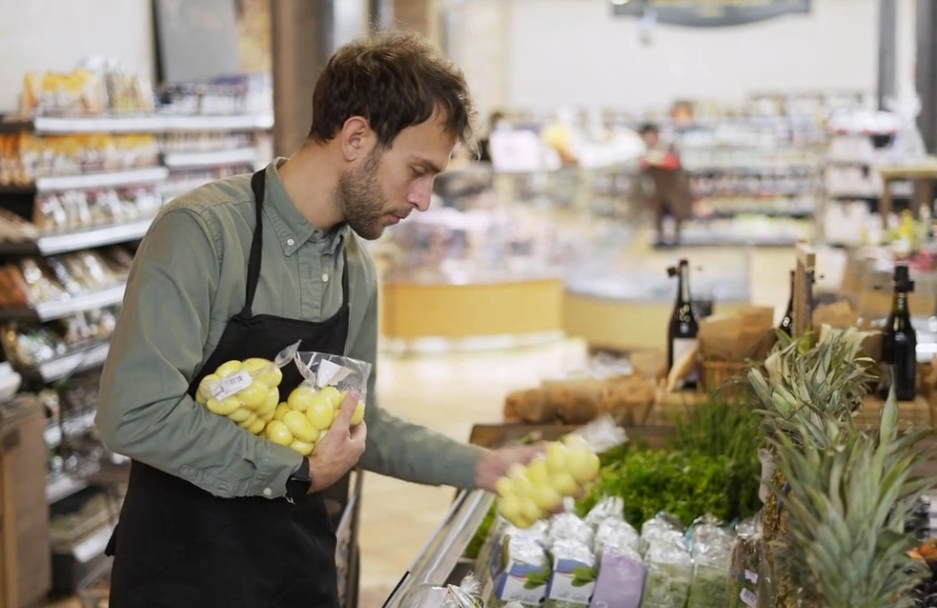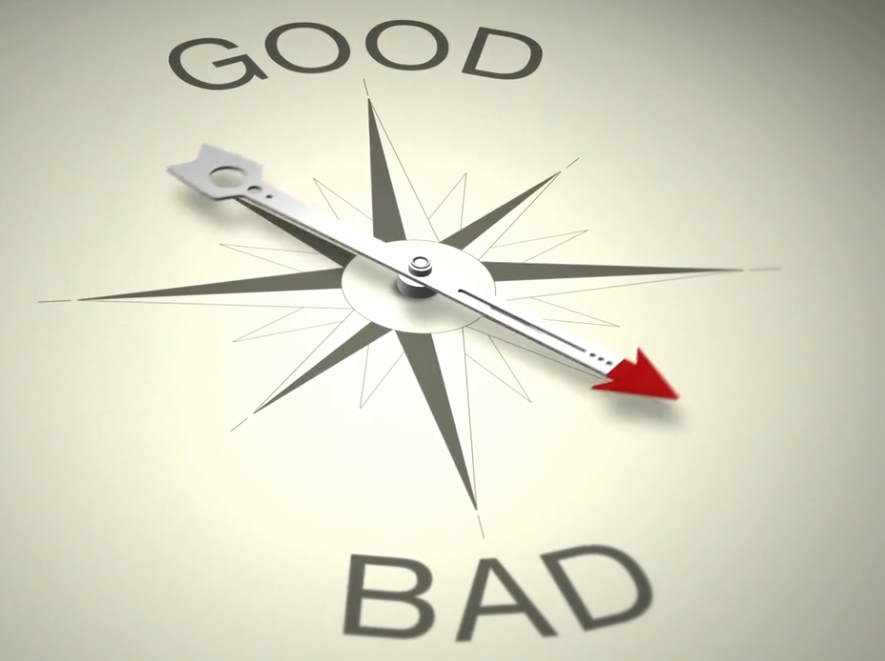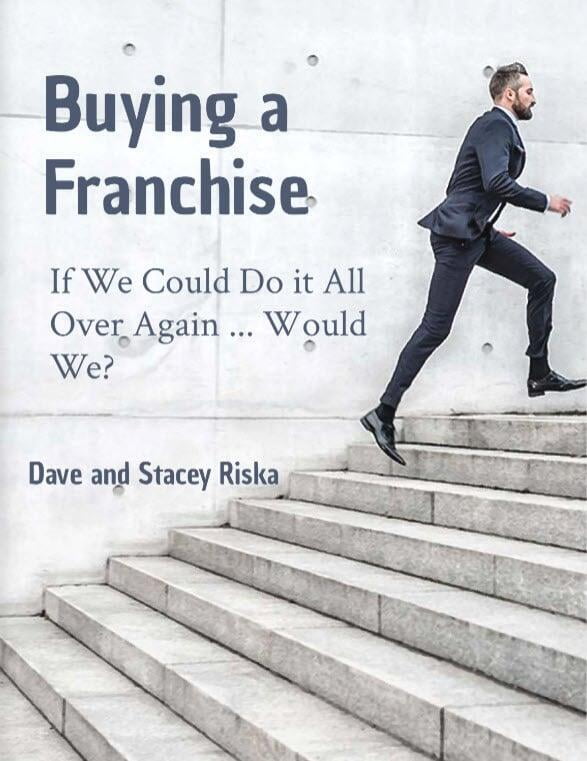We have a very exciting topic today, which will actually probably be broken into multiple episodes because we are jam-packed full of content today. So we're just going to go ahead and dive in.
Now we always like to start with a myth or fact. So question for you Dave (my husband and franchise business partner), "Myth or Fact? Did we know all of the questions we were supposed to ask to help us pick our perfect franchise?"
After a long laugh, Dave says Myth.
Myth is right because if we had to do it over that's what we're going to be sharing with you. Now there are many things that Dave and I have in common, but one of those is that we both love football.
Dave will tell the story.
Oh, sure. So a long time ago, many, many, many years ago, 30+, Stacey and I were at a super bowl party that my roommates and I were hosting. Stacey came with her friends, and during the pre-game show I noticed she had on a Redskins sweatshirt. It would be the Commanders today, to be politically correct. I was sitting a few seats away from her next to somebody else. I was like, wow, she has a Redskins sweater on, I'm going to make this fun. I'm going to bet her that the Redskins were going to lose the game. I said, I bet you that for every touchdown that the Redskins score, I will drink a beer. And for every touchdown that the Denver Broncos score, which happened to be the opposing team in this Super Bowl, you will drink a beer. And the moral of the story was that I believe the score was 44 to 10, the Redskins won.

I lost that bet pretty bad. Actually, I did not. Of course it was a great bet because here we are 31 years later in marriage and everything has been absolutely wonderful. So that's why we love football so much. It’s also why so many people love football and we all tend to kind of be the armchair quarterback. Right? Definitely not you.
We all just sit back and say, "He should have done that and he should have done that. And why didn't he do that? Or why did he do that?" So, it's really easy to be the armchair quarterback.
Well, one additional thing you may not know about us in addition to us loving football is that we still own a franchise today, 16 years later. So today we want to play armchair quarterback and look back at to see if we were to do it again, would we do it again? But more importantly, what questions would we, could we, should we have asked because this is what we help our clients do today so that they can make an informed decision and pick a great franchise … that's a great fit for them.
Those of you that already know us know we love to be transparent and share the good, the bad and the ugly. So the first thing we want to talk about is when you're looking at different franchise concepts, the most important thing you want to do is get clarity of that franchise's strengths and weaknesses. Dave will give a little bit of a background on the model of our franchise and kind of like let's kind of paint the story a little bit so that the audience can understand how you kind of get some clarity on strengths and weaknesses.
So when we went into this franchise search this was our first franchise. We had come out of running another business that we started completely from scratch so we had business experience. So we kind of went into it like, oh, we know everything. What can they possibly teach us about a franchise? But knew this time we wanted a proven system. We want a system that we can just implement and be successful because we felt that with our background and business strengths that we would be able to just take anything that was already kind of predefined and run with it and, and really make it work.
So a little bit about the business model of this franchise, it's a coffee and smoothie franchise that really was developed originally on what they call an events model. Meaning that most of the business that was done by the franchisees at events. They would go out to certain events or they would set up in a stadium or wherever there's a crowd and they would serve their coffees and smoothies in those environments. That was really how the franchise grew so quickly and became successful to that point. What started to happen over time was that the franchise even eventually saw a new need (and probably just from the feedback about their products, their products are really, really, really high quality products). People love them. Probably what was happening is everybody, like what was happening to us, they would ask where's your store? We love this. Where can we get it? Where's your store? And so ding, ding, ding, let's open up a store, right?
Business Model Strengths and Weaknesses
So yeah, ding, ding, ding, the franchisor ran out and decided that they needed to be in brick and mortar also. So we see this today with the franchisors we work with where the franchisors want to have a multiple revenue stream model, which means that for instance, in the food service business, it's common for them to have both brick and mortar and some type of mobile concepts available under the same franchise. In our franchise, they started with a mobile model and went towards brick and mortar. What we see more today is that franchisors are going from brick and mortar into mobile, which both concepts work. So that's really the overall arching framework for how when we went to acquire this franchise, what we were expecting, that was really working well, was pretty much exclusively doing events.
So it was an event based model, something that's super fun, sexy and working well. Then everybody loved the product and they're like great, where's your store? And everybody was asking this within the system. So the franchisor said, okay, great. Let's open up some brick and mortar stores.
What was the problem here you may be asking? Well, the issue was that the management team that was in place at the franchisor really didn't have the experience with brick and mortar. They had never opened and operated a store themselves. They didn't have a proven system!

Since they did not have a store(s) of their own. They were not super familiar with real estate negotiating leases, which will get to a little bit. They kind of rushed into delivering this concept to the franchisees. We were one of the ones that was early on and we rushed in. We felt that everyone loves this product, how could this not work? We'll run down this route, more in a bit. Don’t stop here … you will see what can go wrong.
To start you really need to think about what are the franchise's strengths and weaknesses and kind of where they are headed. But you also want to look at some other things, one of those would be the product. You're buying into a franchise to not only be able to have the brand name, but to be able to offer the product(s) in your business. In our business it was the coffees and smoothies. Now they have an amazing product, but one challenge was they had only one vendor making their product and what happens, dot dot dot, when that vendor comes back and wants to double their price or they go out of business or there's distribution challenges.
Verify the Product and Distribution is Efficient and Economical
We ran into it when there was a strawberry shortage with their smoothies. Our franchise literally could not get strawberries. And if they did, we were going to have to pay like five times the price. So these are considerations when you're looking at a franchise, how and where do they get their product? How is it sourced? Who owns it?
There are franchises where they actually make their own product, and there are literally pros and cons to that as well. Then there are franchises where they outsource their product. So understanding the product piece of it, where and how, and who is the vendor and how, and where are you going to get your product is definitely something you're going to want to fully understand, which then ties into distribution.
How are you going to get your product? I'll give you two distribution nightmares that we had to deal with. The first one was early on when we were just doing the events, or in the event model business. We were running this out of a warehouse and we had at the time commercial freezers and stuff like that to store the product for what we were doing. We had some shelving. There were two issues: one is that we had a minimum product order. At the time we had to order an entire pallet of this mix, this smoothie mix or, or none meaning you need two boxes of smoothie mix but you have to order a whole pallet in order to get some. So each order was thousands of dollars.
To order by the pallet wasn't even the biggest challenge. The biggest challenge was that where our warehouse was, it was not conducive in any way, shape or form in having a tractor trailer pull up and deliver a pallet of anything. So what ended up happening is that the distribution company refused to pull their truck in there, and the landlord of the property wouldn't even allow it. So they ended up negotiating with us to meet them at the shopping mall down the street. We would drive our truck over there, unload an entire pallet into our truck, drive it back to our warehouse and load it into our storage facility. So you could see that was definitely a lot of extra work and a major challenge.
The second major distribution challenge came when we had two brick and mortar locations in an airport. Sounds great right. Well not so much.
The first issue here was that when we wanted to source things that were on the menu, that weren't directly related to this franchise's product mix at the time, in which they were only really familiar with distribution of the coffee and smoothies. We were in the airport and we were doing additional odd things like muffins, water and bottled juice drinks and such. We had to do other things in the airport. The airport absolutely pretty much required it for us to even have facilities there. So the challenge was that we had to work with multiple vendors and coordinate getting all this stuff in there on a regular time basis. Get one thing from here, and another thing from there, and in the airport, it's not easy cuz they don't even distribute the stuff to where your actual stores are located. It goes to a distribution building that's a half a mile away and then gets shipped over to your place by them, and it was really expensive. It became a real challenge to be able to work with this franchise, to get things at a reasonable cost that we could offer that weren't their products and we paid royalties to them for these third party sales (in which we got close to nothing in return). So by the time we would add it all up, in a lot of cases, the third party products netted us almost nothing. That's really because the distribution wasn't well organized and wasn't really well thought through to help the franchisees maintain a healthy profit margin on these products.
To summarize, it's up to you to know where your products are coming from. How easily you can get them? Understand the distribution model, and is there real distribution in place? What and how much do you need to order? Because that's going to impact your cash flow and money that you're going to need perhaps to invest in inventory. How quickly can you get it replenished? What happens if there are issues with the vendor if it's an outsourced kind of model. So these are some of the criteria and questions that you're going to want ask as you're talking to different franchise concepts.
Competition Could Be Healthy ... But Enough is Enough
The next thing that you're going to want to consider is the competition. If you're going to invest in a franchise, you want to know who your competitors are going to be. So is there room for another layer? We were kind of a very small coffee/smoothie concept and guess who our competition was? What everybody drinks, right. That white cup with the green logo on it. And so maybe that's good because I think competition can be a good thing, it means that there is a market, and there is opportunity there, but you should really understand it.
Is there room for you to come in? Do you understand the local dynamics that are happening? Are customers or clients very attached to who they currently use and why ultimately would they want to do business with you? There are so many questions to ask here.

Does the Franchise Have Brand Strength?
The next thing you're going to want to look at is the brand. Now, when you're paying for a franchise fee, this is definitely what you're investing in. You're investing in that brand, that name, that logo. So how is that brand represented and how important is it to you in order to get new business in your area? Now in our coffee smoothie business, people loved our products. But Dave, would you say that the name or the brand was an important part of the franchise?
I think it's the most important part of a franchise. I'll give you an example. When we went out to do events, we'd generally be there with multiple other vendors set up, somehow in a row with them or, even in stadiums and stuff like that. And to get people to buy our product, particularly in the early days, we had to do something called sampling and we had to do a lot of it.
I mean, we had to have people standing out in the front, offering our product to them to try. It was an instant hit. It was love at first sight once they tasted it, they loved it. They would literally go up, take their whole family up and buy a whole slew of smoothies or, whatever we were offering that day. So it was a great product, but it didn't have a well known brand name. As Stacey said, when you think about it, we were literally there competing, with other brands that are a lot more well known for these types of products. You know, which one we're talking about. And there's another one with an M that started serving smoothies after a while. So, and again, competition can be great. It's only great if your brand can stand out and your brand can be important in that market space.
So I think for us in the beginning, we didn't have name or brand recognition, at least in our local area. But as Dave said, we were sampling, we got our product into as many people's mouths as possible. And then people started talking about it and there was brand recognition and people were literally naming our smoothies and they were tagging us on social media. And we, I would say it probably took about two years actually for us to kind of really build a strong name. But then we had that brand recognition, right?
Yeah. It took a while. It really did.
Now the other side of that is that if people love your product and people are seeing that they love your product, people may try and knock you off. You want to talk about how that happened to us, Dave?
I can certainly talk about that too. We were one of the locations where we were set up was in a football stadium. I'm not going to name anybody here. They had us on all three floors or concourses of their stadium. We had a three year agreement with them to serve our smoothies. Actually we served everything. We served smoothies and coffees and actually hot chocolate. So we served them on all three floors for three years and our contract was up for renewal and they said, oh gee, you know what? We don't want to have you back anymore. We're like, well, that sucks. Why? Well, we're going to do it ourselves.
We're going to build our own tiki bar, put a purple surfboard on it. And we're just going to pour smoothies out of a machine. We can do 'them really fast that way. Yeah. And we get to keep all the money. Yep.
So that's what happened, right? I mean, this can happen to you. So literally overnight, we were out of this stadium and somebody else was pretty much doing something like what we were doing. We won't call it the same by any means, but they copied the concept, right? Not necessarily the product or the quality of what we delivered.
So be aware of knockoffs. Know who your competition is, be aware of the knockoffs. And when you're looking at your brand and understanding how important it is. Dave talk about being in an airport and how important is a brand name in an airport location?
Again, it's everything. We were in an airport and I don't want to understate this because we did pretty well there as a whole. The only thing is that we had major brand competition. This airport is one of the busiest airports in the world, not just here in our area and when people are walking around and they're looking for something, they go to things that they recognize, right?
They're going to run right over to the S word. They're going to run right over to the D word or the M word. And, because they recognize it, this is the power of a brand. We had to work really hard to make this concept work in this airport by differentiating ourselves. And again, this came from our prior business experience and pivoting, being able to pivot when things are difficult. We noticed that in this particular wing of the airport where we had our stores, that there weren't a lot of breakfast options. And so we really focused our menu and our messaging to bring people to our stands for breakfast. And, that was really the thing that made these locations work without having a great brand. So we did well with this concept at the airport over time, but it didn't start that way. I mean, it was the same thing. We had nobody at our stands. We've got our employees out there, with bright floral shirts on, standing out, handing out samples to everybody coming by and basically guerilla marketing them into buying stuff from us, as they walk past. And that's not brand recognition that is guerilla marketing.
So actually an airport location can be great for a brand, but brand on a big scale, meaning the franchisor because they're getting so many eyeballs looking at their sign and menu and store, maybe not so good for you as a local operator. I mean, as Dave said, we were in a huge international airport, our people who are traveling overseas, going to ultimately be our customers on a local level? No, probably not.
So it's important that you really understand the dynamics of a brand and what it means and how you can benefit from it both on a local, a regional and a national basis. So those are some considerations and questions to ask related to brand. The next thing you're going to want to get some clarity on is support and training. After all, when you're buying a franchise, you're buying this system and they all talk about the training and the support that you get, but what are you really getting? Now, Dave talk, you know, did we get some training with our franchise?
Support and Training
I can't say no. I mean, we did. I mean we learned, I think we got a very good grasp on how to run the mobile franchise model. The events model. I think they did a really nice job with that training. We got zero training or even assistance on how to run a brick and mortar. So it's very important that you know, depending on your franchise, if they're adding on new models, make sure you get the training and they have it available with that model before you invest in whatever it is they're asking you to do because you might be on your own. We had to literally work the brick and mortar model ourselves, without a lot of assistance just by a lot of it being trial and error. And that's not the way, if you're buying a franchise that you want to do it. You want the proven system, you want to buy what they're good at.

And so with training and support, a lot of the franchises that we work with, they actually do. They have really great training, right? And most of them make you come on site or some of them will come out to you, but make sure you understand what is training? How is it accomplished? And is there any fee for it, but more so than that what happens after training? On the support piece, what happens 3, 6, 9 months down the road? When you have a question, an issue or a problem, who do you contact? What if it's 6AM in the morning? What if it's 10 at night? What if it's on a weekend? Make sure you understand where and how you get support.
As Dave was alluding to in our airport location, the support really became a big issue between us and the franchisor. Mostly because they didn't have the experience to give us any support because they had never done it themselves. But we had run into a challenge where they wanted us to pay royalties on top of our ad fee for products that were quote unquote non proprietary, meaning they didn't make them, create them, sell them to us like the coffees and the smoothies. So we had permission to sell these other products, but they were demanding a huge percentage of the sales, but they were doing nothing for us. They weren't supporting distribution. Anything.
Nothing. Yeah, exactly. So we were on our own and, and this is the lesson learned is that just because they have a new, sexy revenue model be sure that you ask all these questions in advance. What and how are you helping me? Why is this going to work for me? And how are you going to help me be successful? Because I feel like that's where the biggest part of where our franchise came unglued was when they went out of their core strength, which was the event model, and tried to support brick and mortar. I think we probably got more information by talking to other vendors at the airport asking them questions about how to make this stuff work than we ever got from our franchisor.
So these are really important questions to ask. And when you work with us, we're going to give you a checklist. We're going to help you hone in on the questions that you want to ask each of the different franchises, because the questions will be different and we're familiar with all of them.
Marketing R' Us ... You Don't Want This
The next one that we're going to talk about to close out today's issue, which is passionate to Dave and my heart is marketing. Right? You can buy a franchise, you can have the recipe and the proven system, but you still have to do marketing. So how is your franchise going to help you with that? Dave, what kind of marketing help did we get from our franchise?
All right. I want to say zero, but I'll say 1 out of 10. How about that? Yeah. Right.
Let me just finish this statement because I'm passionate about this statement. It's the same thing. We probably got more information about marketing from this food service franchise from other franchisees and outside persons than we ever got from the franchisor. They were the ones that should be telling us, you need to try to do this. You need to try to do that. You got to sample, it's the only way you're going to get this to work because without a brand (we talked about the brand) marketing becomes even more critical.
Marketing is so important. And so you need to understand and ask your franchise, what kind of assets and how do they help you and especially on a local level because the franchisor tends to always think of beating their own chest. They more think in bigger branding terms like do people know our brand? Or are they aware of us and do they like our logo kind of a thing. On a local level you got to talk about guerilla marketing, right? So, what does your franchise do to help you, more so than do they give you a few social media posts? But what kind of marketing assets and how easy are they to create and to produce? We have some franchises we work with where you can very easily go in and customize and make marketing materials easily that you can use on a local level. Some of them (like outs) it's like pulling teeth.
They don't do much of anything. You have to go get your own web site and figure out social media on your own. Oh, you want email marketing, well you go figure that out. So marketing is really important because look, let's face it, that's how you get your customers and clients. So make sure that you understand the marketing piece of it, especially because a lot of people who go into franchising, where they're not so marketing oriented. They don't necessarily come from the marketing background, which is why a franchise can be a great solution for them because those pieces, those assets, those procedures should already in place.
So Dave, we went so, so long on just this one area of a franchisor strengths and weaknesses and some of the considerations and aspects that they should be looking at. We're going to continue this. We've got more.
So make sure you stay tuned for Part 2 of, “If We Had To Do It Over Again”. Thanks for tuning in everybody.
What's Your Next? - Podcast
 | Author BioI’m Stacey Riska aka “Small Business Stacey”, your franchise placement specialist. I help aspiring business owners find the PERFECT franchise so they can get to the next level in life and business. |



